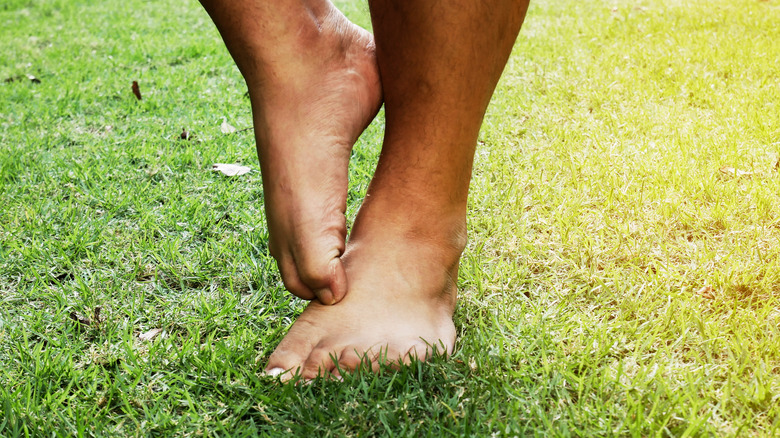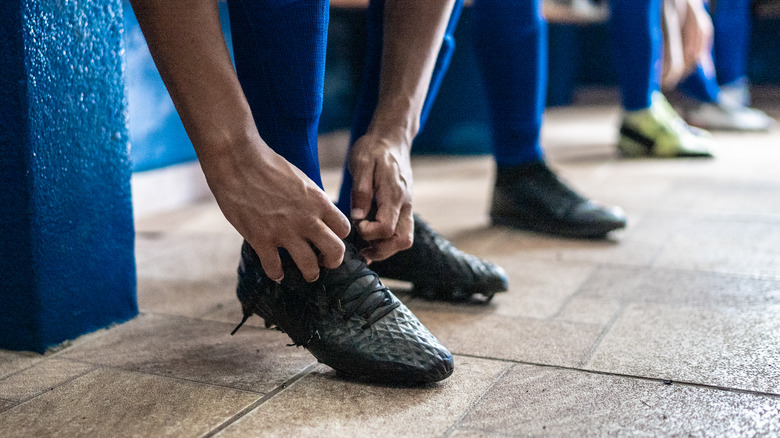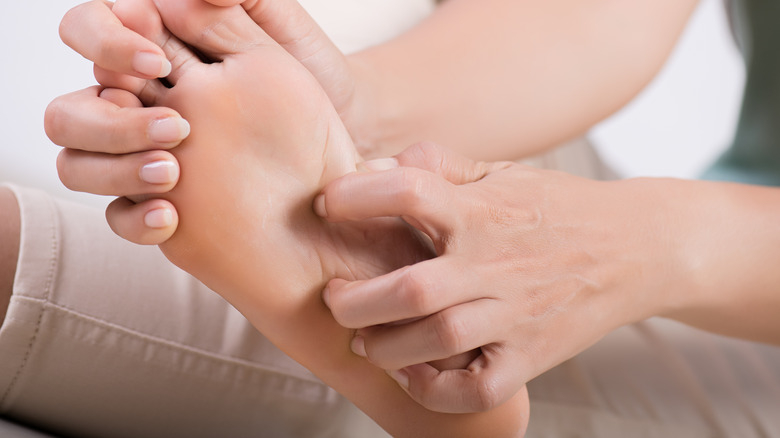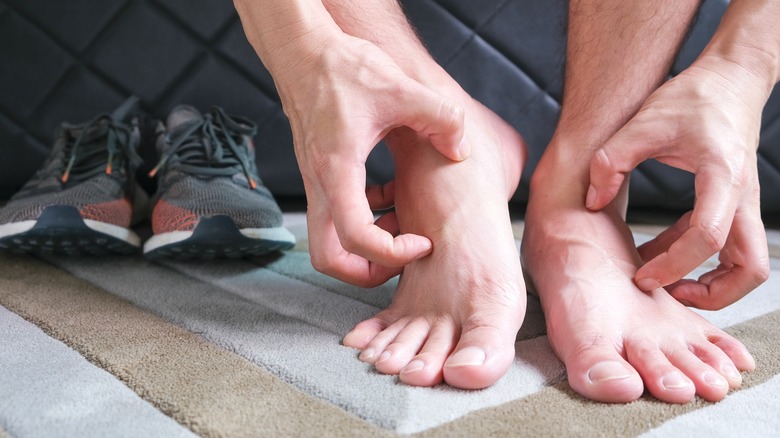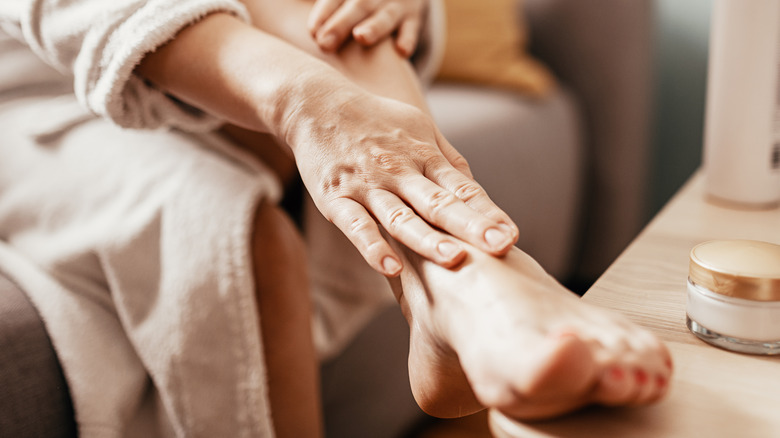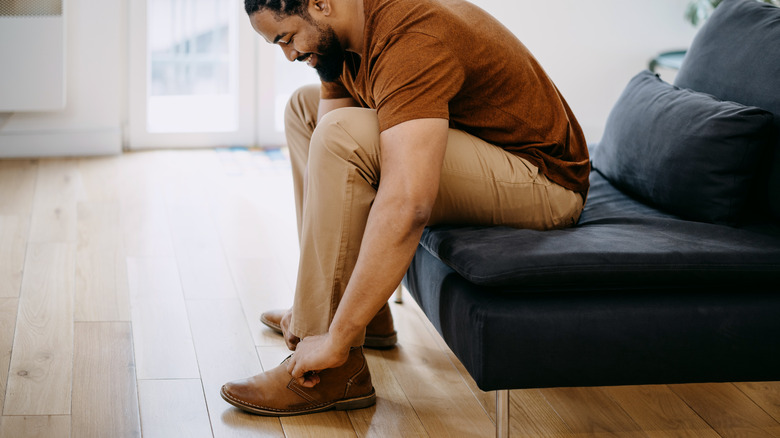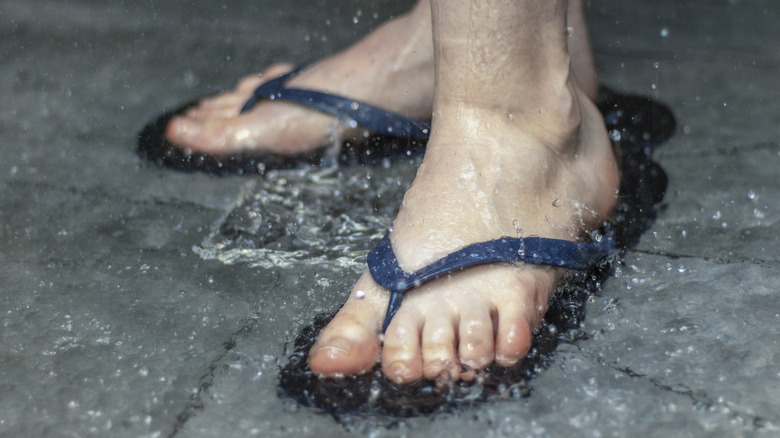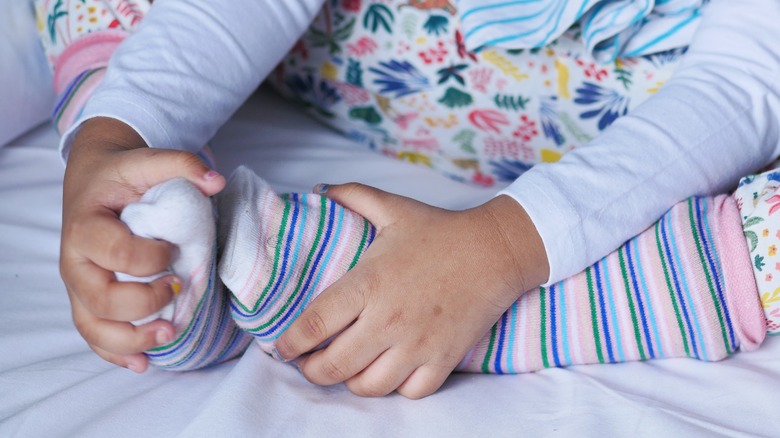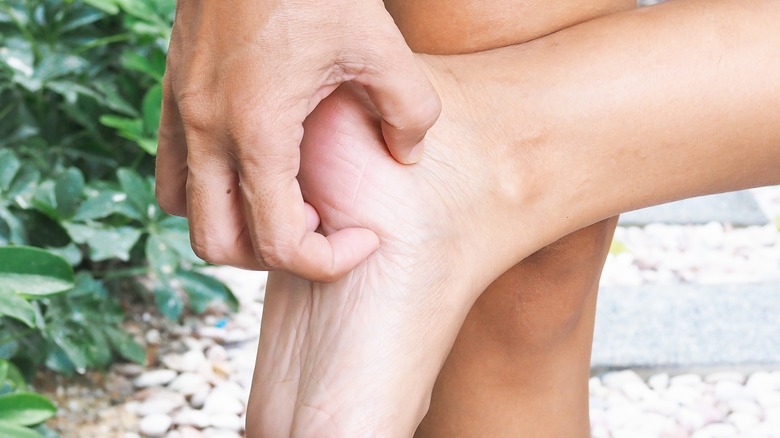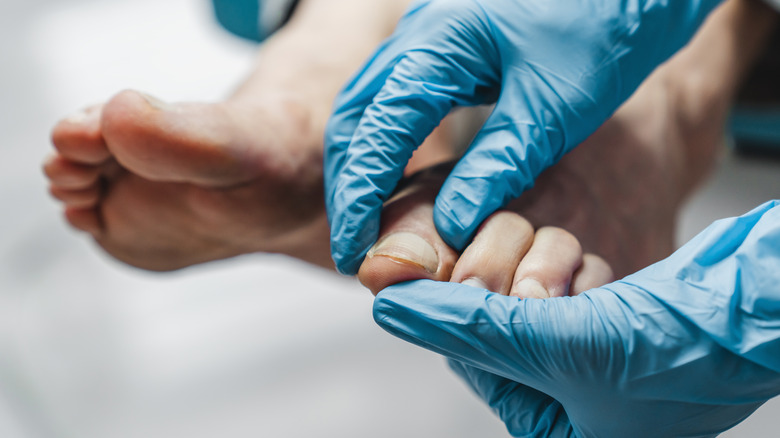Possible Reasons Why Your Feet Are Always Itchy
Undoubtedly, a chronic itch on any part of your body can be irritating. But this can be extra annoying when it happens on your feet, which experience constant moisture, rubbing, and friction as they move you through your life. Perhaps you've noticed lately that your feet are always itchy, no matter what you do. It could be an itch that comes and goes, or you might have started to experience a sudden itch that doesn't get better. Having a chronic itch anywhere on your body is known as pruritus. Your feet can be especially vulnerable to pruritus because they are what you're using to take yourself through the world.
Most people don't think about their feet too much. Regardless, they experience some pretty harsh environments and are exposed to many irritants daily. This is especially true for those who don't wear shoes or socks often. For example, your feet sweat during the day as you wear shoes, leaving them in a moist environment for hours. And if your shoes aren't breathable or your socks are a bit too thick, this can be much worse. This environment opens your feet up to different fungi, parasites, and skin conditions that lead to rashes and itching. Your feet can also be affected by certain conditions of the body.
Read on to learn about the conditions that might lead to your feet always being itchy. This can help you know when to recognize that your foot itching might require seeing a doctor.
Athlete's foot is a common cause of itchy feet
One of the most common causes of itchy feet is athlete's foot. What causes athlete's foot is a contagious fungal infection (via Mayo Clinic). It's typically spread from floors with the fungus, but you might also get it from socks and towels. Those with sweaty feet or who shove their toes into tight shoes are more prone to this fungus.
In addition to the insistent itch, sufferers might experience red scales, stinging, and blisters. Penn Medicine also noted that the fungus from athlete's foot can spread from your skin to your nails, making them thick and discolored. The contagious nature of athlete's foot makes it easy to spread among athletes in locker rooms, giving it its name. Thankfully, though, there are several over-the-counter treatments that you can try to remove the fungus and heal the itch. See your healthcare specialist if the fungus doesn't clear up after a few weeks of home treatment.
Prevention would be the best medicine for this, especially if you play sports or have sweaty feet. Make sure you let your feet air out and wash them often. Clean socks also keep your feet from getting wet (which creates perfect conditions for fungi to grow). It's also important to wear flip-flops or other footwear in public restrooms and showers to keep the fungus from finding its way onto your skin.
Dyshidrotic eczema on feet
If you have a patch of eczema on your arm or chest, you know how itchy and irritating this condition can be. Well, eczema isn't just confined to your arms and hands; it can also find its way to your toes. Dyshidrotic eczema is a common type of eczema that crawls onto your tootsies. It creates small blisters on your fingers and the soles of your feet. The condition also has a particular love for the palms of your hands, according to the National Eczema Association.
The cause isn't easy to nail down, but many researchers think it might be genetic. So, if you have a family member with dyshidrotic eczema, it's probably the cause of your itch. Burning blisters are the most noticeable symptoms, but you might notice tingling or burning on your feet and toes before a breakout. This is a common warning that something has triggered a breakout (via NHS). The moment it starts, your feet feel extremely itchy. Treatment is long-term since there's no actual way to cure the condition. Moisturizers and steroid creams can give you some relief.
The key to keeping the itch at bay is to avoid flare-ups, if possible. Keep your feet clean, dry, and moisturized. It's helpful to keep a journal to identify and avoid flare-up triggers. This could be anything, but some common examples are metals, switching detergents, and even humid weather.
Itchy feet due to psoriasis
Feet that are constantly itching might have a systemic cause, like psoriasis. Typically caused by an immune system malfunction, psoriasis is a painful and irritating condition that causes the skin to build up, flake, and itch, per MedicalNewsToday. The itch can be so consuming that it can make it challenging to wear shoes or walk.
Much like most conditions, psoriasis can come in several different types. According to the International Journal of Molecular Science, the most common type of psoriasis is plaque psoriasis, affecting about 90% of people with the condition. While plaque is the most common, the Psoriasis and Psoriatic Arthritis Alliance states that individuals might also be affected by localized pustular psoriasis, which affects the palms and soles, and acrodermatitis continua of Hallopeau, which can affect the toes. Itchy pustules characterize this form of psoriasis. Psoriasis on the feet can also bleed and crack during a severe flare-up.
Psoriasis isn't preventable, since it's a defect of the immune system. But there are things you can do to avoid flare-ups, like reducing sun exposure, avoiding injuring the skin, and meditating to relieve emotional stress. Medications and topical creams are used to help manage the symptoms. Sufferers of the condition might also try using phototherapy.
Dry skin leads to itchy skin
Itching and pain in your heels can come from dry skin. The area can get so hardened and cracked from the lack of care that it can be painful to walk and open you up to infection.
Dry skin has symptoms similar to athlete's foot and eczema. But the difference is that a bit of ointment or cream specifically for hydrating your feet can help you clear up the problem, according to Bay Area Foot Care. It can also be helpful to use a pumice stone or grater to remove the hard layer of your heels so the creams can penetrate the skin and start healing it. Dr. Lawrence Gibson also recommends using moisturizers containing skin-softening agents designed to remove dead skin (via Mayo Clinic).
Depending on the area that you live in, it can be hard to avoid dry skin, especially in the winter months. Therefore, the American Academy of Dermatology Association recommends protecting your heels to give them time to heal. You'll also want to avoid shoes that don't fit properly, which can worsen the issue. If you're prone to dry skin on your feet, put a bit of petroleum jelly on them at night to soften them up.
It could be a bout of contact dermatitis
Itchy feet can be a vague symptom when seeking treatment. It can help narrow down any triggers or reasons before you head to the dermatologist. Consider contact dermatitis if you notice a trend with a pair of shoes or when you use a specific laundry detergent. According to the Cleveland Clinic, this type of itch comes from an irritant in your environment. So, you get an itch you can't seem to scratch and inflammation on your feet.
A common type of contact dermatitis is shoe dermatitis, where the irritation comes from the material of the shoes or socks. It can also go beyond just the materials to the chemicals they use to process the shoes, per a 2014 study published in Dermatitis. For example, chromium salts are used to tan leather, and different dyes are used to get that vibrant fire engine red heel. These chemicals negatively affect your foot, causing it to itch and become irritated every time you wear that shoe.
Contact dermatitis can be easier to identify because the rash typically happens where the substance touches your foot, causing an odd-shaped inflammation. Once you identify the irritant, avoid it at all costs. Apply cream and ointments to your foot to clear up the rash. Keeping a journal of your symptoms and what triggers them can help you identify contact dermatitis on your feet.
Swelling and itching might come from scabies
An itch that just won't quit is typically a symptom of a skin disorder or possibly a fungal infection. Parasites can also cause you to have itchy feet (via the American Academy of Dermatology Association). Scabies is a mite that burrows deep into the skin, creating an itchy rash that can spread to all areas of your body, including your feet. It can even start on your feet if they are exposed to mites from the floor.
One characteristic of scabies that might be a bit different from eczema or psoriasis is that your feet itch at night, and they leave burrows in lines on the skin. Since they prefer skin folds, itching between your toes can be common. The treatment for this condition is an antiparasitic cream designed to kill the mite and stop the itch. The Cleveland Clinic notes that this cream is typically left on the skin for up to eight hours and then washed off. As little as one treatment is enough to get rid of scabies.
Scabies can affect those with a faulty immune system or small children more severely. Preventing the spread requires limiting contact with a person with scabies and washing the clothing and linens of those with a breakout. Wipe down surfaces of areas that mites might touch, like toilets.
Hookworms create a creeping eruption
You may notice that your feet are always itching after walking barefoot in the sand. You can't stop the itch, and a winding rash is growing from your feet to your legs. Itching, blisters, and a growing rash are symptoms of a creeping eruption caused by hookworms. This itchy rash can grow from ½ to ¾ inches daily, according to the University of Rochester Medical Center.
Creeping eruptions create a terrible itch, but thankfully, hookworms aren't designed to live on the human body. So, this type of itching goes away on its own. There are also antiparasitic creams that can be applied to the area to kill the larvae. You can also prevent infection by wearing shoes in areas with dog and cat feces and deworming your pets to limit exposure. Since most pets are dewormed when they are younger, John Hopkins Medicine noted that creeping eruption infections are uncommon in the United States.
Juvenile plantar dermatosis may cause itchy feet in children
Itchy feet aren't particular when it comes to age. One specific condition common in children from 3 to 14 is juvenile plantar dermatosis, which leaves children with dry, itchy feet and fissures that might crack open. These itchy patches are typically on the soles of the feet and the bottom of the toes.
The American Osteopathic College of Dermatology stated that the condition typically occurs in children with sweaty feet. The sweating and drying of the feet lead to cracks in the skin's surface, causing itching and rashes. It's also noted in DermNet that it happens more in boys than girls and might be linked to children prone to eczema, but the research isn't conclusive. Treating the condition requires treating the cause of the excessive sweating. Shoes that are breathable and absorbent socks might be recommended to break the wet and dry cycles of the feet.
You might also want to apply ointment or cream to the feet to help heal the skin. It can take months for the condition to clear up with proper treatment, but kids should be able to say goodbye to itchy feet with the proper precautions.
Liver disease can affect the feet
Your organs affect each other, so when one isn't running smoothly, it causes issues in other organs, like your skin. Liver disease commonly leads to pruritus (chronic itching) on your feet. Chronic foot itch isn't common in all types of liver disease, according to Healthline. However, primary biliary cirrhosis, damage to the bile ducts, or primary sclerosing cholangitis, inflammation of the bile ducts, are associated with itching.
The cause of the itch isn't entirely known, but theories include the buildup of bile salts or other chemicals within the body (via MedicalNewsToday). Since the irritation comes from the disease, it's impossible to eliminate it. However, treatment methods like medications, moisturizers, cool baths, and cold compresses, are available to make the itchy feet more bearable for patients. It's also helpful to wear comfortable shoes to avoid further irritation.
Avoid anything that might trigger the itch, like heat or stress. Topical creams to soothe the area can also be applied.
The link between itchy feet and kidney disease
Just like you might have a water filter at home, you have a filter in your body. Kidneys are designed to filter out impurities from your blood and turn them into waste. Sometimes, your kidneys can go bad, leading to kidney disease. According to the National Kidney Foundation, kidney disease affects over 37 million individuals. One of the symptoms of kidney disease is pruritus.
Itching and kidney disease are very common, with Kidney Care UK noting that about 50% of patients with advanced disease have itching as a symptom. You aren't only going to experience itching; you'll also have dry skin and a rash. Kidney disease itching can affect all areas of your body, including your feet. The itching might get worse with warm temperatures or insufficient dialysis, and the exact cause of the itching isn't clear (via MedicalNewsToday).
Ensuring that you're treating your kidney disease through dialysis and other treatments can help with the itching, but you may need additional medications, too. Antihistamines and phototherapy can also be helpful.
Thyroid disease causes dry, cracked soles
A thyroid problem goes pretty under the radar until it starts going haywire. You might know that hyperthyroidism can lead to weight loss, while hypothyroidism can lead to weight gain. But this is just scratching the surface of the issues that thyroid disease can cause. Thyroid disease comes from damage to the thyroid gland for several reasons, like your immune system attacking it or viral infections (via Penn Medicine).
In addition to possibly changing the features of your face and eyes, it can cause dry skin and chronic itching. You might even experience deep lines on the soles of the feet and hands, per the AAD. A common place for itchy bumps and rashes is on the palms and feet. These rashes can itch all the time or in waves. Individuals can also experience untreatable hives and thickening of the skin around the nails.
Thyroid disease isn't curable, but medications can help regulate the organ and calm the symptoms. Your medication depends on whether your thyroid is underactive or overactive; the meds must be taken for life to keep the itch at bay.
Neuropathic itch sensations
Your skin typically signals to your brain that you have an itch on your toe, then you scratch it. Sometimes those signals can get crossed, making you feel an itch that doesn't exist. This can be very frustrating since scratching doesn't always help take your itch away. This is known as a neuropathic itch.
According to a 2012 article published in Seminars in Cutaneous Medicine and Surgery, chronic itch on your feet can be "caused by dysfunctions of itch-sensing neurons that produce sensory hallucinations of pruritogenic stimuli." This means that your brain thinks your toe or sole is itchy, but scratching it and medications don't help relieve the symptoms. Neuropathic itch sensations can be among the most frustrating ones to treat because they are due to a malfunction in the brain. Most treatments for this type of itching require something to block the neuron activity leading to the itch.
Several nervous system disorders, like strokes and multiple sclerosis, are known to lead to a neuropathic itch. Harvard Medical School states that shingles are also a common cause of neuropathic itch.
Pregnancy can create itchy feet
Having a child is a beautiful time in an individual's life, but it can also cause some complicated issues in their body. Itchy feet can have several different causes in pregnancy, like hormonal changes, stretching, and nerve sensitivity, according to Healthline. Late in pregnancy, intrahepatic cholestasis can occur, which is a condition related to issues with the liver. This can cause pregnant individuals to experience severe itching on their hands and feet without a distinct rash, per the Mayo Clinic. They also experience jaundice and loss of appetite.
The cause of the itching is similar to chronic itching with liver disease: the bile isn't able to flow properly within the liver, leading to a buildup of bile acids in the blood. The extreme itching can be uncomfortable for pregnant individuals, and can lead to other complications. Therefore, a medical provider might suggest inducing labor if you're close to your due date.

